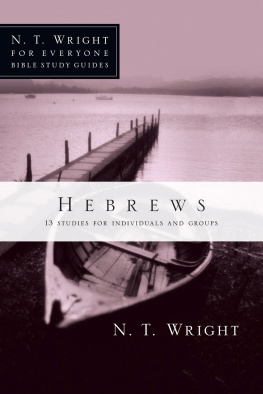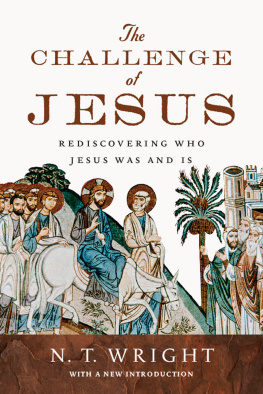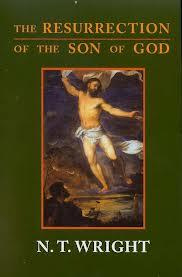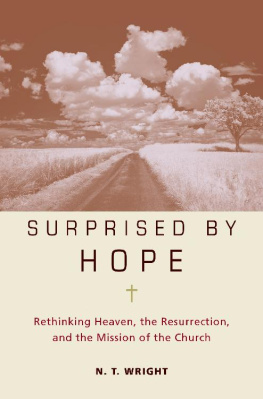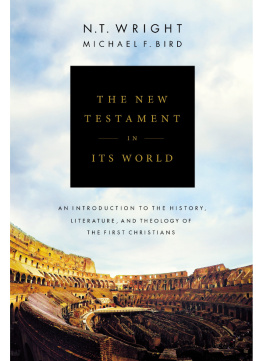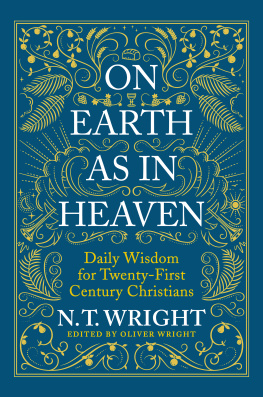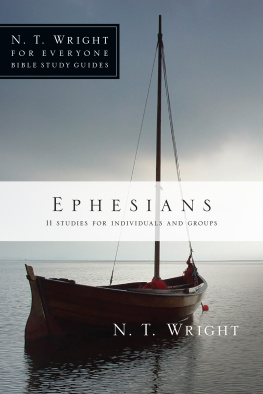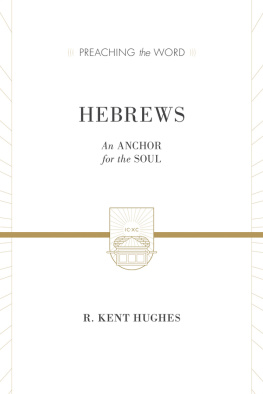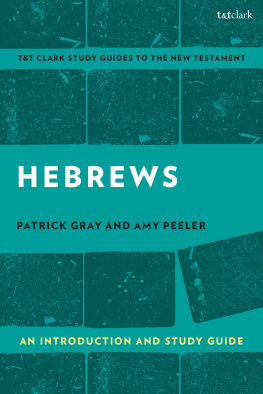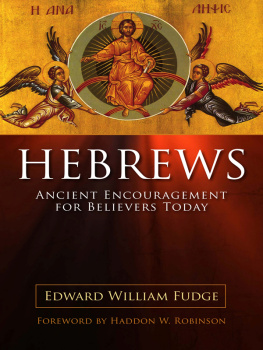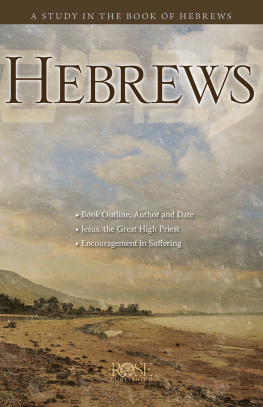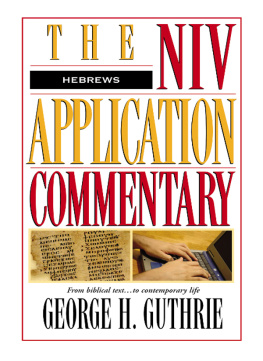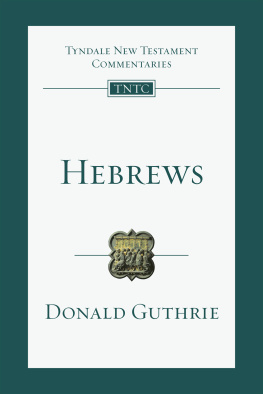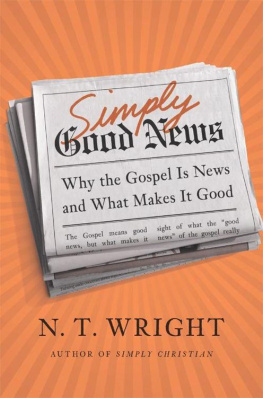N. T. WRIGHT
All rights reserved. No part of this book may be reproduced in any form without written permission from InterVarsity Press.
This study guide is based on and includes excerpts adapted from Hebrews for Everyone, 2003, 2004 Nicholas Thomas Wright. All Scripture quotations, unless otherwise indicated, are taken from the New Testament for Everyone. Copyright 2001-2008 by Nicholas Thomas Wright. Used by permission of SPCK, London. All rights reserved.
InterVarsity Press is the book-publishing division of InterVarsity Christian Fellowship/USA, a movement of students and faculty active on campus at hundreds of universities, colleges and schools of nursing in the United States of America, and a member movement of the International Fellowship of Evangelical Students. For information about local and regional activities, write Public Relations Dept., InterVarsity Christian Fellowship/USA, 6400 Schroeder Rd., P.O. Box 7895, Madison, WI 53707-7895, or visit the IVCF website at .
GETTING THE MOST
OUT OF HEBREWS
H alf the fun of Christmas morning, especially for young children, is the exciting packages in glittering wrapping, with ribbons and bows, all telling you something about how wonderful the present itself will be. Many small children are so excited by the wrapping and the beautiful boxes that they almost ignore the present itself.
The writer of the letter of Hebrews is anxious that the people it is written to should not make that same mistake. The wrapping of the old covenant and its sacrificial system had come off the present; and the present was Jesus himself, Gods own, unique son, sent to fulfill everything the law and the prophets had spoken of. They could move on from the earlier stages of Gods purpose and gladly live out the new one which had dawned. Hebrews is written to urge its readers to not go back to their old ways.
We dont know who wrote the letter of Hebrews, but we do know it was written to Jewish Christians (who of course formed the nucleus of the earliest church). In the very last chapter, Hebrews 13, we have small indications of the situation of the writer and the readers. Verse 19, which sounds similar to what Paul says in Philemon 22, may indicate that the writer is in prison, though nothing elsewhere in the letter leads us to suspect that. Maybe he is simply engaged in difficult work which prevents him from coming to them at the moment.
The sudden mention of Timothy in 13:23, and of his being released, links this letter to Pauls world, but frustratingly doesnt help us get much further with identifying its writer or place of origin. The mention of those from Italy in 13:24 doesnt necessarily mean that the writer was in Italy at the time; it might easily indicate that there was a small community, wherever he was, who had come from Italyconsisting perhaps of those, like the people mentioned in Acts 18:2, who had been expelled from Rome by Claudius. Saying Italy instead of Rome may well be a note of caution, so as not to put Christians there in jeopardy should the letter fall into the wrong hands. (For more on this letter, also see my Hebrews for Everyone, published by SPCK and Westminster John Knox. This guide is based on that book and was prepared with the help of Patty Pell, for which I am grateful.)
This letter seems to be written not in the very earliest period of the church, but perhaps some time between A.D. 50 and A.D. 70, possibly even after that. For many Jewish Christians things were not easy. Lots of their family members and friends and neighbors had not accepted Jesus as the long-awaited Messiah, and they regarded them as dangerous, misguided and disloyal to all that God had said earlier on. All sorts of pressure would have been put on them to try and make them go back to where they had been before, to abandon this new-found movement with its strange claims and to take up again a position of living under Gods law, the law given through Moses.
We know from chapter 10 (verses 32-34) that persecution was a problem for the recipients of this letter. And the writer seeks to further encourage his readers in chapter 11 with examples of those who held to their faith, often in the midst of very difficult circumstances.
Thus, Hebrews was written to show that you cant go back to an earlier stage of Gods purposes, but must instead go forward, must press on eagerly from within the new stage to the one that is yet to come. The letter is a call to not play with the wrapping instead of with the brilliant present itself.
SUGGESTIONS FOR INDIVIDUAL STUDY
1. As you begin each study, pray that God will speak to you through his Word.
2. Read the introduction to the study and respond to the Open question that follows it. This is designed to help you get into the theme of the study.
3. Read and reread the Bible passage to be studied. Each study is designed to help you consider the meaning of the passage in its context. The commentary and questions in this guide are based on my own translation of each passage found in the companion volume to this guide in the For Everyone series on the New Testament (published by SPCK and Westminster John Knox).
4. Write your answers to the questions in the spaces provided or in a personal journal. Each study includes three types of questions: observation questions, which ask about the basic facts in the passage; interpretation questions, which delve into the meaning of the passage; and application questions, which help you discover the implications of the text for growing in Christ. Writing out your responses can bring clarity and deeper understanding of yourself and of Gods Word.
5. Each session features selected comments from the For Everyone series. These notes provide further biblical and cultural background and contextual information. They are designed not to answer the questions for you but to help you along as you study the Bible for yourself. For even more reflections on each passage, you may wish to have on hand a copy of the companion volume from the For Everyone series as you work through this study guide.
6. Use the guidelines in the Pray section to focus on God, thanking him for what you have learned and praying about the applications that have come to mind.
SUGGESTIONS FOR GROUP MEMBERS
1. Come to the study prepared. Follow the suggestions for individual study mentioned above. You will find that careful preparation will greatly enrich your time spent in group discussion.
2. Be willing to participate in the discussion. The leader of your group will not be lecturing. Instead, she or he will be asking the questions found in this guide and encouraging the members of the group to discuss what they have learned.

